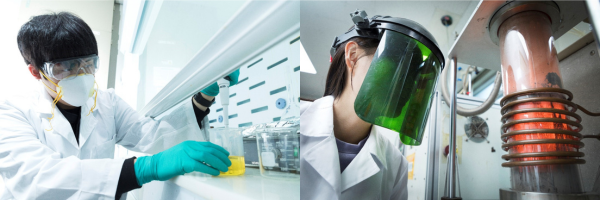"A Good Steelmaker is A Good Slagmaker", A Conversation with Prof. Joohyun Park
Prof. Joohyun Park boasts an extensive background in both academia and industry, with notable contributions that have bridged the gap between theoretical research and practical applications.
As the Director of the Laboratory for the High Temperature Physicochemical Processing of Materials (HiTeP2) within the Department of Materials Science and Chemical Engineering, Prof. Park's illustrious career has been characterised by a steadfast commitment to advancing high-temperature processes.
As part of the 12th International Conference on Molten Slags, Fluxes and Salts (MOLTEN 2024), AusIMM is delighted to welcome Prof. Park to Brisbane, Australia, where he will deliver what promises to be an exceptional plenary address. In anticipation of his upcoming presentation, he shared with us his research endeavors, shedding light on their significance and impact within the field of metallurgy, the importance of basicity in steelmaking slags, how we can reduce the our environmental footprint, and what he is most looking forward to seeing at MOLTEN 2024.

Your research spans a wide range of areas: from inclusion science to sustainable metallurgy. Can you briefly give us a summary of this research – including any challenges and outcomes?
My research career has spanned almost 30 years since I was a graduate student. When I was a master student, my supervisor, Prof. Dong-Joon Min, Chair of the MOLTEN 2021 Conference, recommended me to study what a ‘basicity of slag’ is. Since then, my life as a ‘metallurgist’, which is my lovely word to express myself, has been defined by my email address, basicity@yonsei.ac.kr (1997-2002, Yonsei University), basicity@posco.com (2002-2008, POSCO), basicity@ulsan.ac.kr (2008-2013, University of Ulsan), and basicity@hanyang.ac.kr (2013-present, Hanyang University).
I believe most delegates of the MOLTEN2024 conference would understand the importance of the basicity of slag, which is a dominant factor affecting the physicochemical properties of the slags and fluxes in ferrous, and non-ferrous metallurgical processes.
To my best knowledge, Dr. Lawrence Stamper Darken (1909-1978), who was a director of the Edgar C. Bain Laboratory for Fundamental Research, U.S. Steel Corporation, USA, mentioned a famous saying, “A Good Steelmaker is A Good Slagmaker!”. From this saying, it is certain that clean steels for our improved quality of daily lives is impossible without the knowledge of primary and secondary refining slags and fluxes because the formation, evolution and extinction (removal) of non-metallic inclusions in molten steels are strongly dependent on the physicochemical properties of slags and fluxes.
My research on this technical field for the production of automotive steels, stainless steels, specialty steels, etc. with high cleanliness, has been achieved by designing a proper slag window for each steel grade.
More recently, a sustainable metallurgy for a circular economy to achieve a big agenda of ‘Carbon Neutral 2050’, has been timely issued in metallurgical sectors. A mitigation of CO2 emissions not only via a novel hydrogen metallurgy in ferrous- and non-ferrous industries, but also via a sustainable recycling technology in terms of pyrometallurgical processing can be materialized by applications of fundamental knowledge of slag science.
My research on the sustainable recycling of the electronic wastes and thus recovery of precious metals such as gold, silver, indium, palladium, etc. has been performed by the thermodynamic study of these elements in the slags and fluxes in conjunction with a kinetic study of the smelting process based on the fundamental slag theory.

1. Acid treatment of metal and slag samples. 2. High temperature experiments for smelting reduction process. HiTeP2, Hanyang University
Many of your patents and awards are related to advancements in iron and steelmaking technology. Could you share how your research has been translated into practical applications within the industry, and what impact it has had on improving efficiency or reducing environmental footprint/CO2 emissions?
During my work as a senior research scientist, Technical Research Laboratory, POSCO (2002-2008), the refining technology was developed to produce high-clean austenitic and ferritic stainless steels with less amount of harmful inclusions, specifically MgAl2O4 spinel. It is easily formed in high-Cr stainless steel systems rather than in carbon steels due to several thermodynamic reasons. Deoxidation practice as well as slag chemistry are the critical factors affecting the formation and evolution behavior of spinel inclusions. Surely, the advancement of refining process of stainless steels with improved cleanliness was impossible without fundamental knowledge of slags and fluxes. The relevant review articles were published in ISIJ International (2010, vol.50, p.1333) and Steel Research International (2017, vol.88, p.1700130), co-authored by Dr. Hidekazu Todoroki, Nippon Yakin Kogyo, Japan, and Prof. Youngjo Kang, Dong-A University, Korea, respectively.
After joining University, my research has been collaborated by Korean steel companies, e.g., POSCO, Hyundai Steel, SeAH Besteel, SeAH Changwon Specialty Steel, Doosan Enerbility, etc. The lab-scale experimental findings of thermochemical properties of slags such as sulfide capacity, phosphate capacity, activity of slag components, etc. as well as thermophysical properties such as viscosity, molecular (or ionic) structure, surface and interfacial tension, etc. have been successfully implemented to produce high-end steel products, e.g. high-clean automotive steels and electric steels, high-functional stainless steels, high-purity bearing steels, etc.
Also, the deoxidation practice and reoxidation phenomena of molten steels to improve steel cleanliness have been translated into the plant-scale applications. The relevant review articles were published in Metallurgical and Materials Transactions B (2020, vol.51, p.2453) and Steel Research International (2023, DOI:10.1002/srin.202300598), co-authored by Prof. Lifeng Zhang, North China University of Technology, China, and Prof. Youn-Bae Kang, POSTECH, Korea, respectively. More recently, the physicochemical properties of electric furnace slags have been investigated to reduce CO2 emissions under conditions of active use of direct-reduced iron (DRI) and/or hot-briquetted iron (HBI), which will be implemented into the plant-scale operations in steel companies.
As a leading authority in molten slags, fluxes and salts research, your expertise is highly anticipated for your Plenary address at MOLTEN 2024, on Pathways to green steel including potential impacts electric arc and electric smelting furnace (ESF) steelmaking processes. Can you give us a quick teaser on your address? Who would benefit from it?
I’d like to share this teaser video showcasing high temperature experiments that are relevant to my plenary talk. Graduate students, young researchers, and engineers in academia, as well as in industry working on the pyrometallurgical processes would benefit from it. Check it out, play video below to watch.
What are you hoping to hear from fellow researchers, industry professionals, and attendees during the conference? Is there any specific topic or area of discussion that you're particularly excited to explore or learn more about?
The following agenda (but not limited) is timely issued in ferrous and non-ferrous industry that can draw attention from many delegates including me.
- Extension of slag theory to hydrogen metallurgy and sustainable steelmaking technology
- Applications of slag theory to refining process of high-alloyed steels
- Experimental and modelling methodologies for the structure of molten slags, fluxes and salts
- Development of sustainable recycling process via slag design concept, etc.

